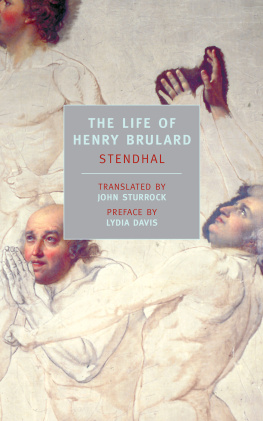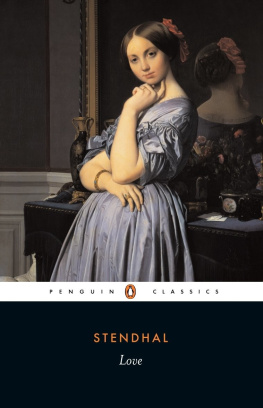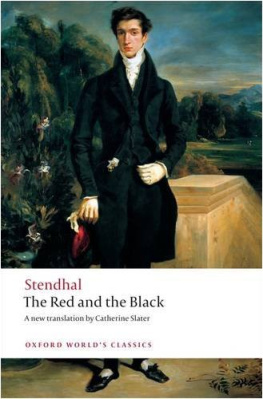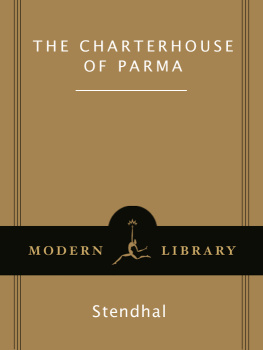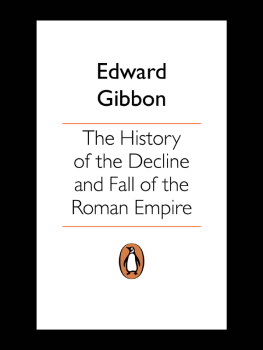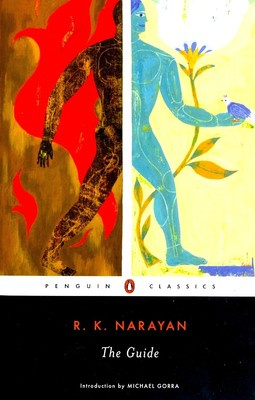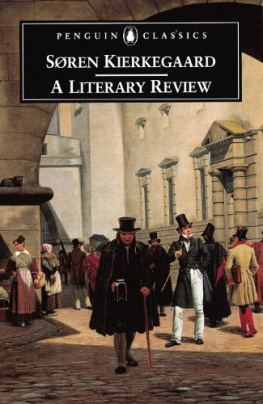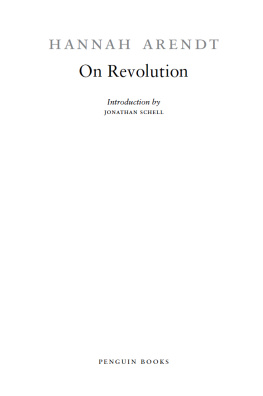INTRODUCTORY PREFACE TO THE TRANSLATION
Stendhal's three prefaces to this work on Love are not an encouraging opening. Their main theme is the utter incomprehensibility of the book to all but a very select few"a hundred readers only": they are rather warnings than introductions. Certainly, the early life of Stendhal's De l'Amour justifies this somewhat distant attitude towards the public. The first and second editions were phenomenal failuresnot even a hundred readers were forthcoming. But Stendhal, writing in the early part of the nineteenth century, himself prophesied that the twentieth would find his ideas at least more comprehensible. The ideas of genius in one age are the normal spiritual food for superior intellect in the next. Stendhal is still something of a mystery to the general public; but the ideas, which he agitated, are at present regarded as some of the most important subjects for immediate enquiry by many of the keenest and most practical minds of Europe.
A glance at the headings of the chapters gives an idea of the breadth of Stendhal's treatment of love. He touches on every side of the social relationship between man and woman; and while considering the disposition of individual nations towards love, gives us a brilliant, if one-sided, general criticism of these nations, conscious throughout of the intimate connexion in any given age between its conceptions of love and the status of woman.
Stendhal's ideal of love has various names: it is generally "passion-love," but more particularly "love l'italienne." The thing in itself is always the sameit is the love of a man and a woman, not as husband and wife, not as mistress and lover, but as two human beings, who find the highest possible pleasure, not in passing so many hours of the day or night together, but in living one life. Still more, it is the attachment of two free fellow-creaturesnot of master and slave.
Stendhal was born in 1783eight years before Olympe de Gouges, the French Mary Wollstonecraft, published her Dclaration des Droits des Femmes. That is to say, by the time Stendhal had reached mental maturity, Europe had for some time been acquainted with the cry for Women's Rights, and heard the earliest statement of the demands, which have broadened out into what our age glibly calls the "Woman Question." How, may we ask, does Stendhal's standpoint correspond with his chronological position between the French Revolution and the "Votes for Women" campaign of the present day?
Stendhal is emphatically a champion of Women's Rights. It is true that the freedom, which Stendhal demands, is designed for other ends than are associated to-day with women's claims. Perhaps Stendhal, were he alive now, would cry out against what he would call a distortion of the movement he championed. Men, and still more women, must be free, Stendhal holds, in order to love; his chapters in this book on the education of women are all an earnest and brilliant plea to prove that an educated woman is not necessarily a pedant; that she is, on the contrary, far more lovable than the uneducated woman, whom our grandfathers brought up on the piano, needlework and the Catechism; in fine, that intellectual sympathy is the true basis of happiness in the relations of the two sexes. Modern exponents of Women's Rights will say that this is true, but only half the truth. It would be more correct to say that Stendhal saw the whole truth, but forbore to follow it out to its logical conclusion with the blind intransigeance of the modern propagandist. Be that as it may, Stendhal certainly deserves more acknowledgment, as one of the pioneers in the movement, than he generally receives from its present-day supporters.
Stendhal was continually lamenting his want of ability to write. According to him, a perusal of the Code Civil, before composition, was the best way he had found of grooming his style. This may well have something to do with the opinion, handed on from one history of French literature to another, that Stendhal, like Balzacit is usually put in these very wordshad no style. It is not, correctly speaking, what the critics themselves mean: to have no style would be to chop and change from one method of expression to another, and nothing could be less truly said of either of these writers. They mean that he had a bad style, and that is certainly a matter of taste. Perhaps the critics, while condemning, condemn themselves. It is the severe beauty of the Code Civil which, makes them uncomfortable. An eye for an eye and a spade for a spade is Stendhal's way. He is suspicious of the slightest adornment: everything that is thought clearly can be written simply. Other writers have had as simplified a styleMontesquieu or Voltaire, for examplebut there is scant merit in telling simply a simple lie, and Voltaire, as Stendhal himself says, was afraid of things which are difficult to put into words. This kind of daintiness is not Stendhal's simplicity: he is merely uncompromising and blunt. True, his bluntness is excessive. A nice balance between the severity of the Code Civil and the "drums and tramplings" of Elizabethan English comes as naturally to an indifferent pen, whipped into a state of false enthusiasm, as it is foreign to the warmth of genuine conviction. Had Stendhal been a little less vehement and a little less hard-headed, there might have been fewer modifications, a few less repetitions, contradictions, ellipsesbut then so much the less Stendhal. In that case he might have trusted himself: as it was he knew his own tendency too well and took fright. Sometimes in reading Carlyle, one wishes that he had felt the same kind of modesty: he, certainly, could never have kept to the thin centre line, and we should have had another great writer "without a style." Effect meant little to Stendhal, hard fact and clearness everything. Perhaps, he would often have made his meaning clearer, if he had been less suspicious of studied effect and elaborate writing. Not infrequently he succeeds in being colloquial and matter-of-fact, without being definite.
Stendhal was beset with a horror of being artistic. Was it not he who said of an artist, whose dress was particularly elaborate: "Depend upon it, a man who adorns his person will also adorn his work"? Stendhal was a soldier first, then a writerSalviati and Salviati, mythical authors of this work on loveall a thin screen to hide his own obsession, which manages, none the less, to break through unmasked on almost every page.
The translation makes no attempt to hide these peculiarities or even to make too definite a sense from a necessarily doubtful passage. Had a translation existed, we should certainly not have undertaken another. As it is, we have relied upon a great sympathy with the author, and a studied adhesion to what he said, in order to reconstruct this essayencouraged by the conviction that the one is as necessary as the other in order to obtain a satisfactory result. Charles Cotton's


